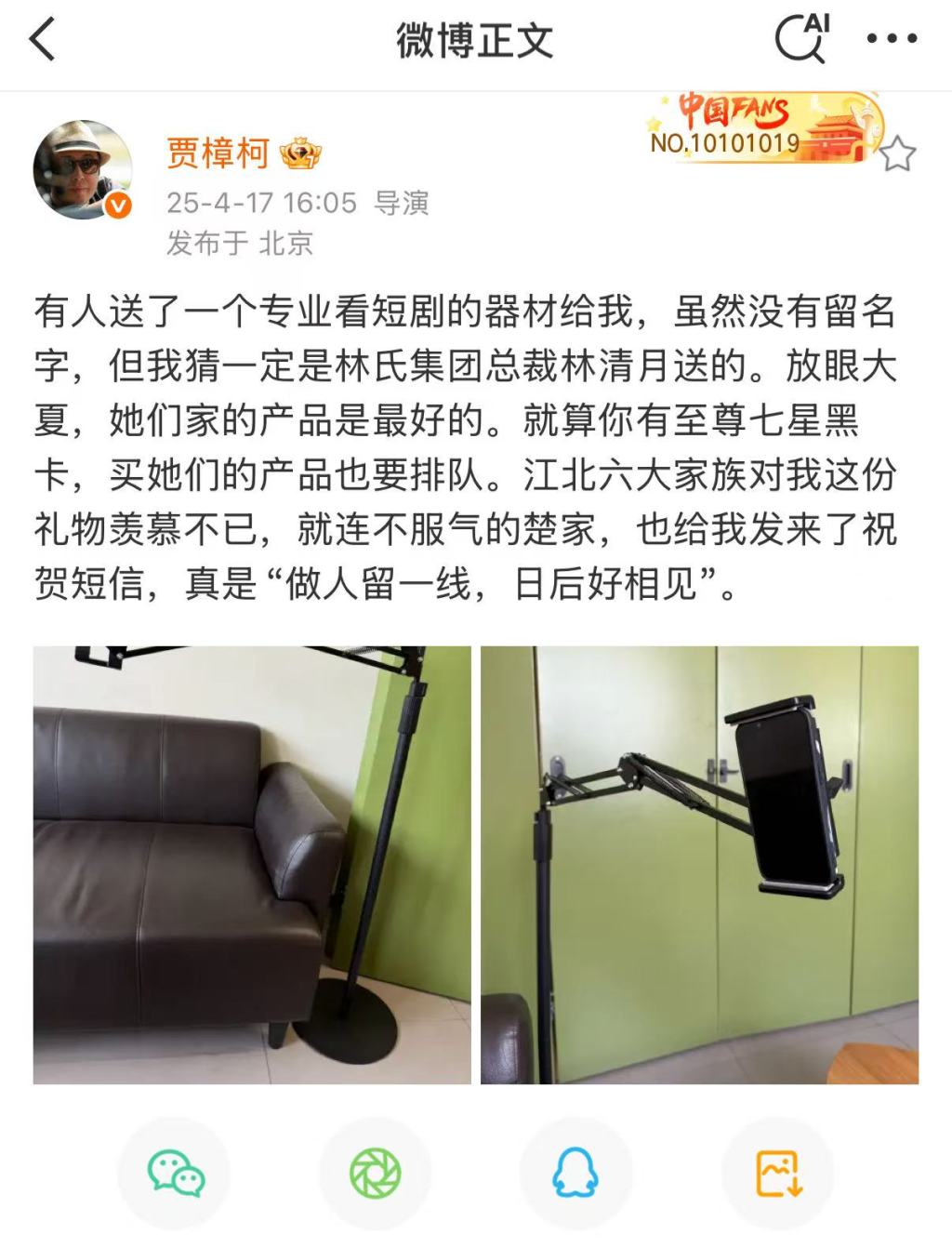
During the 2024 Spring Festival, a short play titled "I Was a Stepmother in the 1980s" was released. After it was released on the third day of the Lunar New Year, it exceeded 700 million views in a short period of time. Since then, watching short plays has become an important entertainment activity for many people during the holidays.
On April 17 this year, the famous director Jia Zhangke shared a humorous text about his experience watching short plays on Weibo: "Someone gave me a professional device for watching short plays. Although no name was left, I guess it must be the work of Lin Qingyue, the president of Lin Group. Their products are top-notch in Daxia, and even those with the Supreme Seven-Star Black Card have to queue up." As soon as this was said, netizens joked: "The section chief has also been marinated by short plays." Faced with the enthusiastic comments, Jia Zhangke only responded briefly: "I enjoyed watching it." This understated response revealed his open and inclusive attitude towards short plays.

Screenshot of Jia Zhangke's Weibo
This shows that short plays are no longer "lightweight" content that simply serves the purpose of pleasure. With the continuous development and deepening of the industry, especially in the theme of women's growth, a number of excellent short plays that are both entertaining and profound have gradually emerged.
Below, we focus on three highly acclaimed short dramas, exploring how they combine suspense, ancient style, family emotions and other creative elements to break out of the traditional narrative mold and show new possibilities for female themes.
Let’s take a look during the May Day holiday!
"Bring Her In" - Female awakening under the guise of suspense

Poster of "Bring Her In"
"Bring Her In" uses the refreshing shell of "killing the scumbag" to wrap the spiritual core of female mutual assistance. When full-time housewife Zheng Qi found out that her husband cheated on her and transferred property, she did not perform the traditional "beating the mistress" drama, but instead formed an "Avengers Alliance" with the nanny Ma Hongli and the third party Bei Pianpian. The three of them divided the work in a sophisticated way: pretending to be rich women to set up a trap, collecting evidence of cheating, breaking the property trap, and even using the husband's greed to lure him into the trap.
What is refreshing is the symbiotic wisdom of the three women across classes. Zheng Qi transformed from a "canary" to an entrepreneur, Ma Hongli used the survival wisdom of bargaining in the vegetable market to solve the capital puzzle, and Bei Pianpian tore off the label of "mistress" to regain her dignity. When they clinked their red wine glasses in the living room of the mansion, this "sisters helping sisters" fight back, which has transcended personal grudges and become a declaration of women's awakening.
"This Life is More Frustrating" - The Modern Soul in the Rebirth Drama
If "Bring Her In" is a survival guide for modern women, "This Life is More Satisfactory" gives a new voice of feminism to costume short dramas. After the heroine Liu Ruyi was reborn, she did not indulge in the routine of "house fighting and face-slapping". Instead, when her elder sister tried to steal her marriage, she said: "I will not marry a prince or a general. If I want to marry, I will marry the future I have earned."

The play is full of ingenuity that breaks the barriers of time and space: facing the princess's sarcasm that "women should take care of their husbands and children", she retorted that "women with high social status should make a career"; when the male protagonist wanted to solve the problem for her, she smiled and refused, "Sir, please see what I can do." These dialogues that span ancient and modern times make the counterattack of concubines in the feudal background a spiritual projection of modern independent women. The screenwriter and director even arranged for the female protagonist to eventually establish a women's school, so that "rebirth" no longer stays in personal revenge, but turns into a spark to promote gender equality.
"At Home and Away" - Reconstructing Motherhood in the Daily Life
In the Sichuan and Chongqing alleys of "Home and Away", stepmother Cai Xiaoyan is rewriting the traditional family narrative. This "crooked woman" is neither gentle nor forbearing: when her stepdaughter was falsely accused of stealing money, she rushed into the school with a broom to argue; when her husband's business failed, she turned around and set up a roadside stall to support the whole family. But under the rough appearance, there is delicacy - she quietly knitted the unfinished sweater for her stepdaughter and her mother, brought her children to worship her deceased wife on Qingming Festival, and reconstructed the boundaries of maternal love with the philosophy that "stepmother is also a mother, but not a substitute."

The camera shots of "At Home and Away" by director Yang Kenan are full of human life: when the whole family was sharing the cake, she cut off the surname card with one knife - these details full of vitality make women's growth no longer an empty slogan, but a real transformation soaked in sweat and covered in coal dust.
The success of these works indicates that female narratives are finding unique expressions in the short drama track. First, the anti-routine character arc: from "waiting for rescue" to "actively breaking the deadlock", the female protagonists use multiple ways such as entrepreneurship, solving cases, and housekeeping to realize their values; second, the de-labeled relationship: tearing off the stereotyped identities of "main wife", "mistress", and "stepmother", showing the complex and fluid emotional connection between women; finally, the down-to-earth metaphor system: the inheritance of maternal love in the knitting needles and the reorganization of the family under the cake knife make the expression of ideas concrete and tangible.
When Jia Zhangke and others began to use professional equipment for vertical screens, short plays were no longer synonymous with "fast food". These works, which are competing with traffic algorithms every minute, are using the most fashionable media forms to tell the most authentic female power - just like the sweater knitted by the heroine in "Home and Away" with new and old wool, weaving a new texture in the interweaving of tradition and innovation.

Jia Zhangke once collaborated with a platform to shoot the short drama "Harvest"


